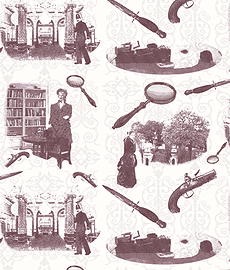TooClued

"I generally find that I can well afford to continue with my cluelessness …"
I sometimes use the term Clueless to mean the opposite of its denotive meaning. I can certainly seem clueless because of an obvious lack of clues, but I sometimes feel overwhelmed by a rather un-obvious abundance of them, especially subtle ones. In retrospect, by gazing into my rearview mirror (the one where things sure do appear to be a whole lot closer than they are), I finally register what seems like should have been obvious before, when I wandered as if clueless when merely unable to see forest for the proliferation of trees. I believe that clueless only rarely means an absolute absence of clues, but rather a curious inability to winnow them down into any immediately useful form. I focus upon foreground when the real story's unfolding in background or I'm simply not paying close enough attention, or even too close of attention. ©2018 by David A. Schmaltz - all rights reserved
When I observe another wallowing in obvious cluelessness, I often wonder how it could be that they cannot see all the feedback trying to inform them. The inability seems willful. I easily conclude that I'm observing obliviousness or insensitivity in action when hyper-awareness or extreme sensitivity might equally explain what I'm seeing. Someone focusing upon catching molecules won't even see any trees, let alone any forests. Someone focusing upon seeing red cars won't see very many other-colored ones. Expectations blind me every bit as well as my intentions do, and clues have a way of coming in unanticipated guises. Later, I might find myself detached or numb enough to catch what my hyper-vigilance could not discern before.
Sherlock Holmes was notorious for his ability to detach and thereby render himself more observant. My friend David uses the term Afford To Know to explain how clues can sometimes contribute to cluelessness. If I cannot Afford To Know what stands before me, I might quite reasonably render myself incapable of perceiving it. I might ogle Tiffany's window displays without once taking the jewelry there very seriously, if only because I cannot imagine it being there for me. I could not possibly afford anything shown there so I can't afford to really see it. Especially when encountering a presumed worse case scenario, I've proven myself more than capable of simply seeing right through the radiation wave of clues washing over me. An impending divorce or death seems to encourage denial more than acceptance, at least at first, producing an apparent cluelessness, baffling to more detached observers. Detachment might carry the mother of all unanticipated clues. Vigilance sometimes returns little on its investment. limiting what we believe we can afford to know by overwhelmingly expanding what we might buy into, producing a tyranny of disquieting choices easier to see through than actually see or choose between.
Modern physics adequately explains how this world is not what it seems to be. For centuries, religious and social convictions colored the interpretations dedicated scientists employed to support their conclusions. Galileo could not really afford to observe that our earth rotated around the sun. He bought it anyway. The entire cheering section jeered him for his insights. If he'd relied upon the results of an internet poll to justify his science, he could not have advanced science. Popular delusion often colors our cluelessness an attractive hue, almost guaranteeing that even the more obvious clues cannot contribute to any useful, clued-in conclusion. Some clues come as definite unthinkables, worse than worst case scenarios. When these appear for me, I generally find that I can well afford to continue with my cluelessness, in spite of the proliferation of contradictory clues confronting me.


